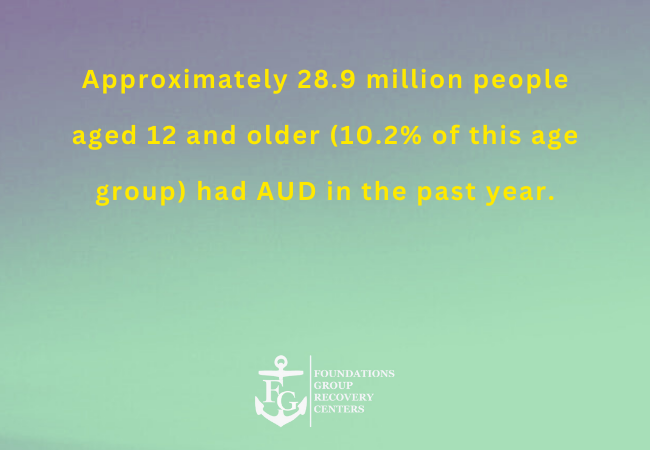Alcohol addiction is a serious condition that affects millions of people, yet many individuals hesitate to seek treatment due to their work schedules, family responsibilities, or financial constraints. Unlike inpatient rehab, which requires a full-time commitment, outpatient alcohol treatment provides structured, professional care while allowing individuals to continue their daily lives.
At Foundations Group Recovery Centers, we offer comprehensive Outpatient Addiction Treatment in Massachusetts, providing individuals with the flexibility to balance recovery with their work, family, and personal obligations. Our programs combine evidence-based therapies, counseling, and medical support to help individuals achieve long-term sobriety without disrupting their daily routines.
In this guide, we will explore:
- What outpatient alcohol treatment is and how it works
- The key benefits of outpatient programs
- Different types of outpatient alcohol treatment options
- Who is a good candidate for outpatient treatment
- How to balance recovery with everyday responsibilities
- How outpatient programs support long-term sobriety
What is Outpatient Alcohol Treatment?
Outpatient alcohol treatment is a structured, evidence-based recovery approach that allows individuals to receive treatment without staying in a residential facility. Patients can attend therapy sessions, medical consultations, and support groups on a scheduled basis while continuing their normal routines.
Unlike inpatient rehab, which provides 24/7 supervision, outpatient programs allow patients to:
- Participate in counseling sessions while maintaining their work and family responsibilities.
- Engage in group therapy and peer support without leaving their home environment.
- Receive medication-assisted treatment (MAT) to help manage withdrawal symptoms and cravings.
- Develop coping strategies for real-world situations, improving long-term recovery success.
Outpatient treatment is customized to each individual’s needs, ensuring they receive the support they require while continuing to lead their daily lives.
Benefits of Outpatient Alcohol Treatment
1. Flexibility for Work, School, and Family Responsibilities
Outpatient alcohol treatment allows individuals to attend treatment sessions while continuing with their daily obligations. Whether maintaining a career, caring for children, or attending school, outpatient programs provide the flexibility needed for recovery without major life disruptions.
2. Professional Support Without Full-Time Commitment
Although outpatient programs do not require a residential stay, they still provide professional medical support, counseling, and relapse prevention services, ensuring that patients receive the same high-quality care as inpatient programs.
3. Cost-Effective Alternative to Inpatient Treatment
Since outpatient programs do not require overnight accommodations or full-time staff, they tend to be more affordable than residential rehab programs while still providing effective treatment.
4. Maintaining a Support System at Home
Patients in outpatient treatment can stay connected with family, friends, and their support networks throughout recovery. Having a strong support system at home can significantly enhance the chances of long-term sobriety.
5. Long-Term Recovery and Relapse Prevention
Outpatient programs help individuals develop sustainable recovery strategies and continue working on their sobriety while facing real-world challenges. Many programs include ongoing relapse prevention planning to provide lasting success.
Types of Outpatient Alcohol Treatment Programs
Outpatient treatment is not a one-size-fits-all approach. The right program depends on the severity of alcohol addiction, personal responsibilities, and medical needs.
1. Day Treatment Programs (Partial Hospitalization Program – PHP)
- Designed for individuals who need intensive daily treatment but do not require 24-hour care.
- Patients attend treatment for multiple hours per day, several days per week.
- Includes medical monitoring, therapy sessions, and group counseling.
- Best suited for those transitioning from inpatient rehab or requiring structured support.
2. Half Day Treatment Programs (Intensive Outpatient Program – IOP)
- A step down from PHP, providing flexible but structured care.
- Patients attend therapy 3-5 days per week, for a few hours each day.
- Includes individual therapy, behavioral counseling, and relapse prevention strategies.
- Ideal for those with moderate alcohol addiction who need structured support.
3. Standard Outpatient Treatment
- The most flexible option, with therapy sessions scheduled 1-2 times per week.
- Includes individual counseling, peer support, and educational programs.
- Best for those with mild alcohol addiction or in long-term recovery.
At Foundations Group Recovery Centers, we customize outpatient treatment plans based on individual recovery needs.
Who is a Good Candidate for Outpatient Alcohol Treatment?
Outpatient alcohol treatment is an excellent option for individuals who:
- Have mild to moderate alcohol addiction.
- Are highly motivated to recover but cannot commit to full-time inpatient rehab.
- Have a supportive home environment that promotes recovery.
- Do not experience severe withdrawal symptoms that require medical detox.
- Are transitioning from inpatient rehab and need continued support.
For individuals with severe alcohol addiction, a history of relapse, or an unstable home environment, a residential treatment program may be a better initial option before moving to outpatient care.

How Outpatient Programs Support Long-Term Sobriety
Recovery does not end after treatment. Outpatient programs are designed to provide ongoing support and relapse prevention strategies to help individuals maintain sobriety for the long term.
1. Individual and Group Therapy
Regular therapy sessions help individuals address underlying triggers, develop coping mechanisms, and receive ongoing emotional support.
2. Continued Medication-Assisted Treatment (MAT)
Medications such as naltrexone and acamprosate can help manage cravings and reduce the risk of relapse.
3. Family Therapy and Support Groups
Outpatient programs often include family counseling sessions, helping loved ones understand addiction and support the recovery process.
4. Sober Living and Community Support
Many outpatient programs provide connections to sober living homes and peer recovery communities, helping individuals stay accountable and engaged in their recovery journey.
By integrating these elements, outpatient treatment programs set individuals up for long-term success in sobriety.
Why Choose Foundations Group Recovery Centers?
At Foundations Group Recovery Centers, we provide comprehensive outpatient alcohol treatment programs that offer the flexibility, support, and structure needed for successful recovery.
Our Outpatient Treatment Services Include:
- Customized treatment plans based on individual needs.
- Flexible day and half-day treatment options for those balancing recovery with daily life.
- Evidence-based therapies, including cognitive-behavioral therapy (CBT).
- Medication-assisted treatment (MAT) to manage withdrawal and prevent relapse.
- Group therapy and family counseling to strengthen support systems.
- Long-term relapse prevention strategies to sustain sobriety.
Our mission is to help individuals achieve lasting recovery while maintaining their daily responsibilities.
Conclusion
Outpatient alcohol treatment provides a practical and effective way to overcome alcohol addiction while maintaining work, family, and personal responsibilities. Whether you need intensive day treatment, half-day support, or flexible outpatient care, there is a program designed to fit your needs.
If you or a loved one is seeking Alcohol Addiction Treatment in Massachusetts, Foundations Group Recovery Centers is here to help. Call us today at 844.763.4966 to learn more about our outpatient treatment options and take the first step toward sobriety. A healthier, alcohol-free future is within reach.
FAQ on Outpatient Alcohol Treatment
What is outpatient alcohol treatment?
Outpatient alcohol treatment is a structured program that provides therapy, counseling, and medical support while allowing individuals to continue living at home. Unlike inpatient rehab, outpatient programs offer flexible scheduling, making it easier to balance treatment with work, school, and family responsibilities.
How does outpatient alcohol treatment work?
Patients attend scheduled treatment sessions, including:
- Individual and group therapy
- Medical check-ins and medication-assisted treatment (MAT)
- Behavioral counseling and relapse prevention education
The number of weekly sessions depends on the level of outpatient care required.
What are the benefits of outpatient alcohol treatment?
- Flexibility to maintain work, school, and family responsibilities
- Cost-effective alternative to inpatient rehab
- Access to professional medical and psychological support
- Continued connection with a support network at home
- Long-term relapse prevention strategies
What types of outpatient alcohol treatment are available?
- Day Treatment Programs (PHP): Intensive care for several hours per day, multiple days per week.
- Half Day Treatment Programs (IOP): Structured therapy with more flexibility, ideal for those transitioning from inpatient rehab.
- Standard Outpatient Programs: Weekly sessions for long-term support and relapse prevention.
Who is a good candidate for outpatient alcohol treatment?
Outpatient treatment is best for individuals who:
- Have mild to moderate alcohol addiction
- Are motivated to recover but cannot commit to full-time inpatient rehab
- Have a supportive home environment
- Do not experience severe withdrawal symptoms that require inpatient detox
Can I work while attending outpatient alcohol treatment?
Yes! Outpatient treatment is designed for individuals who need to balance recovery with their careers. Many programs offer evening or weekend sessions to accommodate work schedules.

